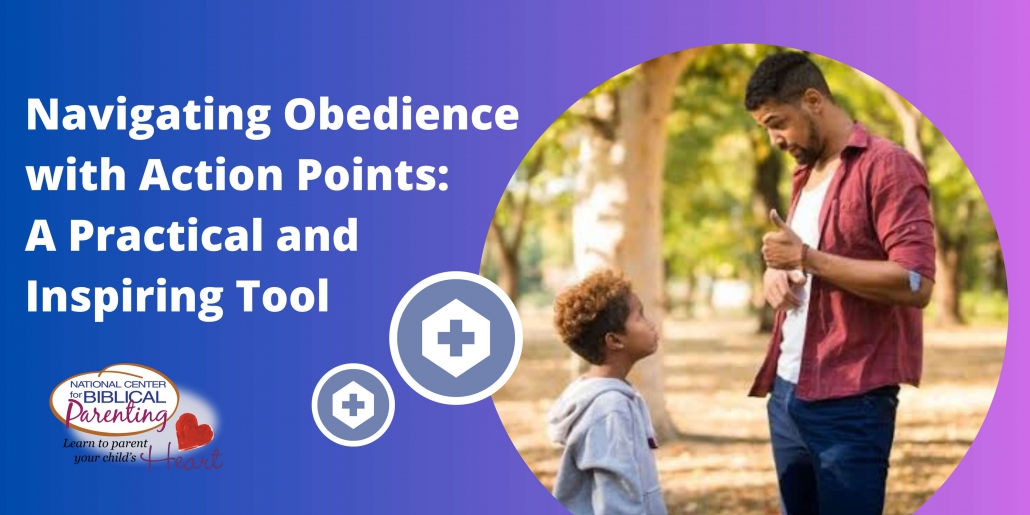Navigating Obedience with Action Points: A Practical and Inspiring Tool

As parents, we often find ourselves searching for effective ways to get things done without increasing tension in relationships. In fact, some parents shy away from asking their children to do things, because they want to avoid the conflict that often ensues. It’s important that children learn how to obey, respond to authority, give up their agenda, and do things they don’t want to do.
There are several benefits to teaching obedience. It’s more than just getting tasks done. Hidden within obedience are the success principles of life that involve responsibility and responsiveness to others.
Children need to know that there are certain instructions that require immediate action, not because we are being demanding, but because cooperation involves giving up some of our own desires in order to care for others or get things done. How might children know when a parent means business without communicating to them that the task at hand is a mere suggestions or idea?
In this blog post, we will explore the concept of Action Point—a powerful tool for fostering obedience. By embracing a heart-based approach and using strategic communication techniques, we can inspire our children to respond promptly and wholeheartedly to our instructions. Let’s delve into practical strategies that are both compassionate and rooted in biblical principles.
An Action Point is the pivotal moment when we, as parents, transition from talking to taking action. It’s the point where our children realize that we mean business, and immediate compliance is expected. By incorporating Action Points into our parenting approach, we provide clarity and empower our children to differentiate between instructions that require obedience and other forms of communication.
Action Points go beyond mere repetition; they teach children to recognize the seriousness of an instruction and respond accordingly. Words hold immense power, and the way we frame our instructions can influence our children’s perception about the instruction. By starting an Action Point with the child’s name, followed by “you need to,” we activate their conscience and cultivate a sense of obligation.
The words “you need to” reinforce the understanding that this instruction holds weight and importance. Additionally, concluding the Action Point with the word “now” instills a sense of urgency and prompts immediate action, further reinforcing the significance of obedience. The conscience serves as a moral compass within us, guiding our decision-making process. By intentionally creating uncomfortable feelings associated with responsibility, we help our children understand the importance of obedience.
This discomfort mirrors the responsibility and accountability they will face throughout their lives. Children actually go into the workshop of their hearts where they develop patterns of responding to others. It’s a vital part of their character development and prepares them to make choices based on moral values. Action points eliminate the need for constant reminders and create an atmosphere where children recognize the weight of their parents’ words. This approach encourages them to
Internalize the importance of obedience, paving the way for personal growth and a healthier parent-child relationship. The Bible provides numerous examples and teachings about obedience, both for children in regards to parents but also for adults working with any authority.
Obedience played a crucial role in the lives of biblical figures, shaping their character and spiritual journeys. God tested the Israelites’ obedience during their wilderness journey, underscoring its significance in building trust and faith. By grounding our parenting approach in biblical principles, we align ourselves with God’s design for the family and equip our children with essential life skills rooted in obedience.
Incorporating action points into our parenting approach not only fosters immediate compliance but also equips our children with invaluable life skills rooted in obedience. By embracing a heart-based perspective and implementing practical strategies, we can inspire our children to respond promptly and wholeheartedly to our instructions. This intentional approach trains their consciences, cultivates a sense of obligation, and prepares them for the responsibilities and choices they will encounter throughout their lives.
Motivate Your Child

You will learn:
- How to build a strong conscience to strengthen internal motivation
- How faith changes kids in practical, down-to-earth ways
- Ways to help self-focused kids think of others
- A strategy to help kids who tend to blame, rationalize, or defend
- Ways to use consequences for heart change
- Specific heart-based strategies to develop responsibility and initiative



Leave a Reply
Want to join the discussion?Feel free to contribute!